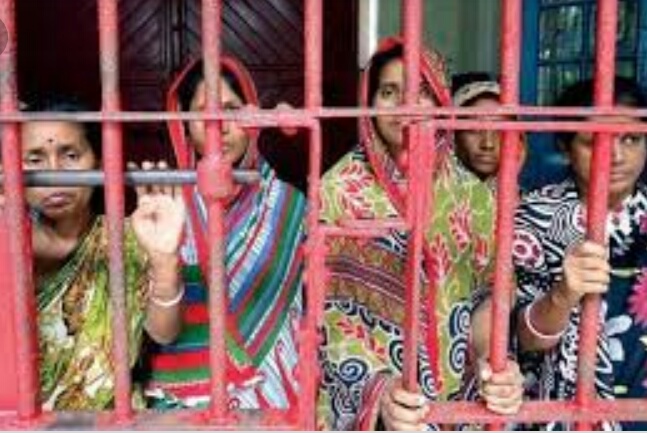Live Makkah
Live Madinah
Urdu Font Download
Latest News:
Padubidri: Fishing boat capsizes; all 7 fishermen on board rescued Alleged atrocity on lawyer: Punjalakatte SI suspended Moral policing at jewellery shop: 4 arrested Bajrang Dal activists try to assault youth, girlfriend in Mangaluru SC to hear Bilkis Bano’s plea against release of 11 convicts on 13 Dec Nusrat Noor: First Muslim Woman to Top Jharkhand Public Service Commission
Latest News:
Padubidri: Fishing boat capsizes; all 7 fishermen on board rescued Alleged atrocity on lawyer: Punjalakatte SI suspended Moral policing at jewellery shop: 4 arrested Bajrang Dal activists try to assault youth, girlfriend in Mangaluru SC to hear Bilkis Bano’s plea against release of 11 convicts on 13 Dec Nusrat Noor: First Muslim Woman to Top Jharkhand Public Service Commission
Amnesty releases chilling report on detention camps in Assam, urges authorities to end gross human rights violations

New Delhi, 25 Nov 2018 [Fik/News Sources]: Releasing a damning report on detention camps in Assam, global rights body’s Amnesty India Friday urged the authorities to end human rights violations against persons declared foreigners by the Foreigners Tribunals and held in detention centres across the state and sought introduction of a “statutory time limit” on their confinement as a suspect cannot be confined to more than 90 days.
The Amnesty also presented some former detainees before the media who narrated their ordeal in the detention camps. Ashraf Ali and Kismat Ali, both 41, said they had been picked up from their homes in Sonajuli village, in Assam’s Udalguri district, in August 2015 and were sent to a foreigners’ detention camp in Goalpara. Both survivors said they were released in October 2017 — two years and two months later — after the Supreme Court upheld the duo’s case that their families had migrated to Assam decades ago from Bihar and Uttar Pradesh.
Detention centres are overcrowded and there is no segregation between the detainees, and convicts and undertrial prisoners. Kismat Ali, a former detainee said to us, “The room had a capacity of 40. When we reached there it was filled with around 120 people. There was no space. We had to live on top of each other.” Detention causes serious harm to detainees’ mental and physical health, as well as harm to their family members. This is especially so in cases of indefinite detention. Medical facilities are inadequate, especially mental health treatment.
The process of updating the National Register of Citizens is only adding to the prevailing uncertainty and fracture lines in Assam. This year, there have been at least 16 reported instances of people committing suicide for fear of losing their citizenship.
According to the report titled as “Between Fear and Hatred: Surviving Migration Detention in Assam”, as on 25 September 2018, 1,037 persons declared foreigners were being detained in detention centres in Assam.
Many do not know what crimes have led to their incarceration. Most of them do not know what the future holds. They have no certainty about whether they will ever be released, and if so, when.
The report traces the process by which these detainees ended up in detention. There are 100 Foreigners Tribunals across Assam which determine if persons brought before them are foreigners. The burden of proof to prove Indian citizenship is on the person accused. Often investigations are lackadaisical and notice is not served on the person.
The researchers also analysed 167 appellate judgments of the Gauhati High Court. The researchers interviewed five lawyers who practice in the Foreigners Tribunals in Assam, two High Court lawyers and a former member of a Foreigners Tribunal.
It states that detention of ‘irregular foreigners’ in detention centres within prisons, often indefinitely, has become routine in Assam. The briefing traces the history of the anti-foreigner agitation in Assam, the legal regime and processes for identifying, detaining and deporting ‘foreigners’, and the inhumane conditions in detention centres in Assam.
“The government of Assam should remember that the constitutional right to life and personal liberty is available to all persons, including foreigners. Detention must be an exception, and used only as a last resort, while dealing with irregular migrants. Our study found a number of persons who have been in detention centres for months and even years, without any access to parole. They are separated from their families and have limited contact with the outside world. Other than severely restricting movement and access to livelihood, indefinite detention has devastating effects on the mental health of those detained and their families”, said Aakar Patel, Amnesty India.
The report is based on semi-structured interviews with key stakeholders, including individuals who had been detained and their families, doctors who work in prisons in Assam, academicians, lawyers who practise in the Foreigners Tribunals and Gauhati High Court, a former member of a Foreigners Tribunal and a former Special Monitor of the National Human Rights Commission. Relevant laws and policies, as well as orders from appellate courts, were examined.
Amnesty India found that:
There is no statutory limit on the period for which individuals declared as foreigners can be detained.
Individuals declared as foreigners are kept inside criminal prisons along with convicts and undertrial prisoners.
Circumstances and conditions of detention cause harm to individuals’ mental and physical health.
Foreigners Tribunals, which adjudicate citizenship cases, follow flawed processes to identify irregular foreigners.
“We saw very high levels of depression. They didn’t understand what was happening to them. They had no way of exiting from there. They had no idea of the future. They were lonely, desperately lonely. It was really hellish. There is no arrangement to deal with the mental health burdens that exist,” said, Harsh Mander, former Special Monitor of National Human Rights Commission (NHRC) who visited two of these detention centres who warned that it may lead to Rohingya type crisis.
I made a detailed report on the deplorable and inhuman conditions of detention camps but the Rights Commission refused to forward it to the government and to act on it, therefore I resigned as the special monitor of NHRC, Mander said.
He said even parole is not given to detainees on the pretext of being “foreigners” and added that there is no extradition treaty between India and Bangladesh.
“International law says that such detention should be for around 90 days, and if necessary for another three years but here there’s no end to this. India is not even negotiating a treaty with Bangladesh in this matter. So what is this detention leading towards?”
“In fact, 30% of the 1,037 detainees in detention centres as on 25 September 2018 were declared foreigners in proceedings they were not even aware of. There is pressure on Tribunals to dispose off a large number of cases and that is disturbing. The authorities have totally failed to consider non-custodial alternatives to detention,” said Leah Verghese, an Amnesty India researcher who worked on the briefing.
“Families are being torn apart. Children are growing up in detention. No child should have to grow up in a prison,” said Aman Wadud, a lawyer working on detention cases. There are 31 children inside detention centres in Assam as of 25 September 2018. Many female detainees told Amnesty India that there were children inside the detention centres, staying with their mothers. Some of them had even attained majority in custody. Detention of children with their parents in these prisons is contrary to international human rights standards, and violates the principle to always act in the best interests of the child.
Assam-based researcher Abdul Kalam Azad shed light the history of migrant movement in Assam since 1920 and some two lakh PIP were deported. In 2011 some rules were changed for detection of foreigners and shoddy investigation is done.
Amnesty India’s questions to the Assam government on detention centres remain unanswered. The time has come for the Assam government and the Government of India to take concrete measures to address inhumane conditions in detention centres in the state. The Assam government must seek non-custodial alternatives to detention wherever possible.
Asmita Basu, Amnesty India’s Programs Director, said, the nearly 30-page report draws from “empirical data gathered through semi-structured interviews with key stakeholders and informants, including six individuals who had been formerly detained, and families of seven individuals who had been or are in detention”.
The report also examines the history of the anti-foreigner agitation in Assam, the proceedings before the Foreigners Tribunals, the use of detention for persons declared as foreigners and the updation of the National Register of Citizens.
Prayer Timings
| Fajr | فجر | |
| Dhuhr | الظهر | |
| Asr | أسر | |
| Maghrib | مغرب | |
| Isha | عشا |







